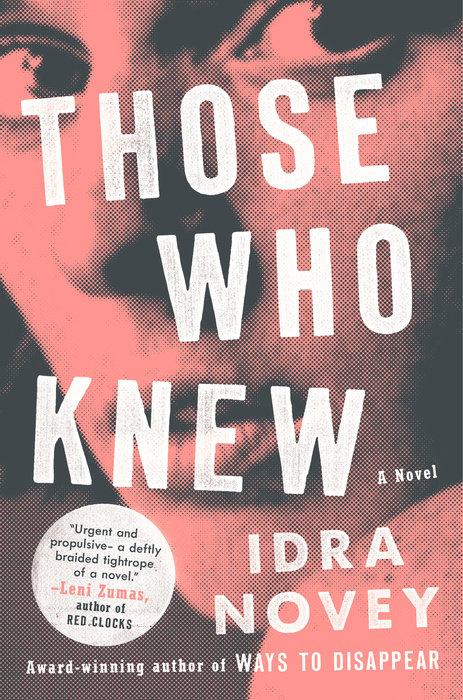
Though it’s largely set in an unnamed Latin American nation, Idra Novey’s new novel Those Who Knew abounds with moments that will sound familiar to readers in the United States. There’s a seemingly-idealistic male political candidate whose upstanding veneer conceals bleaker impulses; there’s the fact that said candidate’s treatment of women places him one potential scandal away from (justifiable) ruin. Novey’s novel abounds with legislators compromised by their ties to industry, artists from the upper class relentlessly mocking the foibles of the wealthy, and a landscape in which the political and the intimately personal are inexorably connected.
The setting of Novey’s novel is never named, but a few specifics are given–including the fact that it opens shortly after 2000, and that an authoritarian political party’s hold on power has slipped. That said party’s name is Cato is telling: it recalls the libertarian Cato Institute, which has published articles applauding the economic maneuvers of the Chilean dictator Augusto Pinochet. (And, on a more literary level, which has frequently hosted author and occasional politician Mario Vargas Llosa.)
Those Who Knew occupies an interesting and constantly-shifting ground: it’s a novel about the necessity political change (several characters are activists, and one runs a radical bookstore), but it’s also a story about the compromises and flaws that accompany those seeking to implement change. Victor, the politician at the center of the narrative, speaks in an idealistic manner but is easily manipulated even before his emotional issues come into play. And Lena, the novel’s protagonist, is much more genuine in her political expression, but is also adversely affected by her family’s connection to the nation’s politics and her own history with Victor.
Through a shifting cast of characters and a structure that incorporates fragments of plays and daily records along with more traditional third person passages, Novey evokes a grand scale. She at once traces the political ups and downs of this fictional nation and contrasts it with both certain real-world events in the United States–and, in doing so, also examines more broadly the legacy of how the United States exerted its influence in Latin America over many years with bleak results.
Novey’s novel is shaped by politics, but it’s also about the limits of politics. Reading it in an era where politicians are being held accountable for their actions both in office and outside of it, it’s not difficult to see parallels and resonances with the last few years of politics in the United States. That’s one of many reasons why this novel feels particularly gripping right now: it’s tapped into many of the same questions that are being addressed in the news, in editorials, and in heated conversations wherever politics is discussed.
But Those Who Knew isn’t simply about politics: it’s about how people, and all of their flaws, help shape politics for good and for ill. That in turn puts it in comparison with some other recent novels that explore the gulf between political ideals and the human flaws of those who do the everyday tasks of making those ideals into something more concrete. Like Those Who Knew, Sergio de la Pava’s novel Lost Empress has an expansive focus and ambitious plot, taking into account the interconnections between a host of legislative, economic, and cultural issues. Here, de la Pava’s focus is on two parallel plotlines, one about an upstart football team and the other about the current state of the carceral system. Just as Novey’s geographic and temporal scale allows Those Who Knew to evoke decades of history across an entire hemisphere, de la Pava’s seemingly random pairing turns out to be anything but, making it another harrowingly relevant look at the state of all things political.
The use of a fictional nation in Those Who Knew also allows Novey to explore particularly pointed thematic ground: in other words, in writing about a fictional nation, she’s able to evoke the history of numerous nations without being tied to one in particular. (See also: Alejo Carpentier’s Reasons of State.) To an extent, this also allows Novey to grapple with grand ideas more directly. Here, there are parallels with Carrie Vaughn’s Bannerless and The Wild Dead, two novels set in a technologically-diminished future about a character tasked with codes of law that not everyone respects equally. What these seemingly disparate books have in common is a haunting reminder of what can happen when the common beliefs of a shared society are shattered–another element that resonates uncomfortably with our present politics.
The late Mario Cuomo famously said, “You campaign in poetry; you govern in prose.” For writers who have embarked on fiction about the nature of governance, the style of choice may be somewhere between the two: a balance between the soaring language and grand ideas of the former and the comprehensive expression of the latter.
Follow Vol. 1 Brooklyn on Twitter, Facebook, and sign up for our mailing list.
